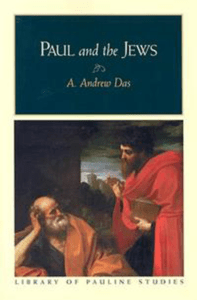
The latest book in the Library of Pauline Studies series, Paul and the Jews examines the question, “How did Paul’s thinking compare with that of the Jews of his time? ” By providing a survey of the scholarly views on this question, Andrew Das offers the beginning Pauline student an entrance into the interesting world of Pauline studies and then presents his own conclusions to this pivotal question.
Endorsements:
Arguing for a ‘newer perspective on Paul’s as a way to understand how the great Apostle viewed the Jewish people and their law in the light of Jesus Christ, Andrew Das has made a significant contribution to Pauline studies that will also serve as a firm exegetical footing for a constructive dialogue between Christians and Jews. Professor Das’s careful reading of Paul’s letters, especially Romans and Galatians, shows that while Paul affirms the centrality of Jesus Christ for salvation, Paul is not a super-sessionist. Paul and the Jews opens new vistas for those searching for an informed understanding of Paul’s thinking about Israel, its law, and its Messiah.
– Frank J. Matera, The Catholic University of America
The topic of Andrew Das’s new work requires that he address a whole series of issues that have proven controversial in recent Pauline scholarship: the two-covenant theory, the identification of the ‘weak’ and the ‘strong’ in Romans 14, the place of the law in the lives of Christians, and, of course, the ongoing debate between the ‘new perspective’ and traditional reading of Paul. All are tackled head-on in an accessible, informed, and balanced way. Das’s fresh – and thoughtful – proposals are sure to garner attention, and Paul’s impact on Jewish-Christian relations is the subject of stimulating reflections. A book for students and scholars alike.
– Stephen Westerholm, McMaster University
This book places itself in the midst of the discussion on the ‘New Look’ in Pauline studies, and makes an important contribution to that debate. Whether one is disposed to follow that way of seeing Paul’s theology or not, this book will surely provoke further reflection. Well written and cogently argued, it will reward a careful reading.
– Paul Achtemeier, Union Theological Seminary
Book Details:
Originally: Hendrickson Publishers
ISBN-10: 0801045983
ISBN-13: 978-0801045981
Release Date: April 1, 2003
Reviews:
1. Journal for the Study of the New Testament 26.4 (2004) – Simon Gathercole
2. Catholic Biblical Quarterly 67 (2005) – Florence Morgan Gillman
3. Interpretation (July 2004) – A. Katherine Grieb
4. Expository Times – Eric Eve
5. Recherches de Science Religieuse 93/3 (2005) – J.-N. Aletti
6. Banner of Truth (Aug-Sept 2005) – Philip H. Eveson
7. Southern Baptist Theological Seminary (2005) –
8. Andrews University Seminary Bulletin (Spring 2005) – P. Richard Choi
9. Review of Biblical Literature (9/2004) – Timothy Gombis
10. Choice (June 2004) – C. Carey Newman
11. Heythrop Journal 46 (April 2005) – Patrick Madigan
12. Reformed Theological Review 64.1 (April 2005) – Philip Kern
13. Journal of the Evangelical Theological Society 48/1 (2005) – Kent Yinger
14. Themelios (Summer 2005) – M. Sydney Park
15. Toronto Journal of Theology 20/2 (Fall 2004) – Murray Baker
16. Theological Studies 66/2 (June 2005) – Joseph Plevnik
17. Theologische Literaturzeitung 132/3 (2007) – Jürgen Habermann
18. Religious Studies Review 31/1-2 (April 2005) – David W. Kuck
19. The Master’s Seminary Journal (Spring 2006) – Paul R. Thorsell
20. Churchman (Summer 2006) – Stephen Walton
21. Shofar 24/4 (2006) – Mark Reasoner
22. Bible Today (March-April 2004)
23. Southern Baptist Journal of Theology (Nov 2004) – Thomas R. Schreiner
24. International Review of Biblical Studies 50 (2003—2004)
25. Theology Today (2004) – Jeffrey Siker
26. Master’s Seminary Journal (2006) – Paul Thorsell
27. Religion & Society (2005) – Christoph W. Stenschke
28. Ashland Theological Journal (2005) – Brenton Dickieson